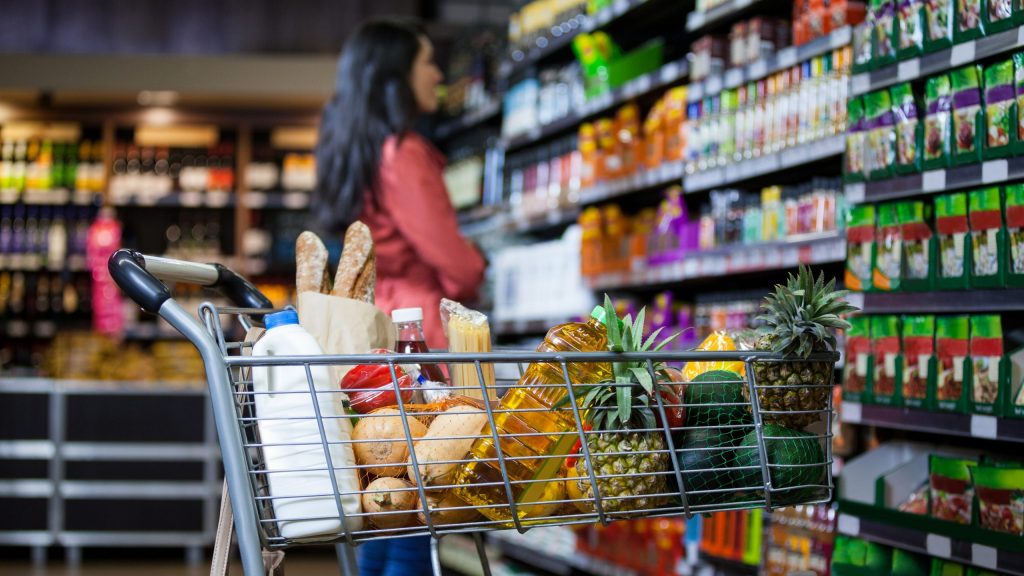What you should know before you use a buy now, pay later program

Paying for groceries has become such a struggle for some that consumers are searching for ways to offset the costs. While some shoppers are taking advantage of coupons or viral video hacks to slash their grocery bills, others are signing up for a program that defers in-full payment at the cash register. A number of major grocery retailers including Albertsons, Costco, Target and Trader Joes now offer a buy now, pay later (BNPL) program as an alternative to cash, debit or credit card payments.
In the first two months of 2023, the usage of BNPL in the grocery sector jumped by 40%, according to a recent study released by Adobe Analytics.
The rise of buy now, pay later usage for groceries tells us that consumers are likely making bigger purchases online to take advantage of special promotions and stock up on staples, thus managing living expenses in more flexible ways, said Vivek Pandya, a lead analyst for Adobe.
Adobe How Does Buy Now, Pay Later Work?
A buy now, pay later option might sound the same as using a credit card. However, there are some fundamental differences, according to Investopedia.
First, buy now, pay later options are available for consumers who might not have a credit card. These short-term loans are offered by companies such as PayPal, Afterpay, Affirm and Zip and typically give a customer the option to choose an installment payback plan. Usually, its four payments over a couple of weeks or months. Typically, a down payment (25%) is made at the time of purchase and the rest of the balance is paid off in installments.
For example, if a shopper has a $200 grocery bill, they would make a $50 down payment up front and pay the rest of the $150 balance over the next few weeks or months. For short-term loans, such as four weeks, many BNPL companies will not charge interest.
However, there are various fees for these loans, including service, transactional and rescheduling and penalties for having insufficient funds and late payments. Its vital to note that every BNPL company has different terms, so its important to review them carefully before applying for a loan.
How Else Is BNPL Different Than Credit Cards?
The other major difference between buy now, pay later options and a credit card is the relative ease of securing a BNPL loan. The few restrictions for most customers who want to use PayPal Later, Affirm or other BNPL companies usually include that they must be at least 18 years old and have a debit card.
A credit score is not always necessary to secure a buy now, pay later loan, which means it can be easier for people with no established credit to take advantage of a payment plan. However, some BNPL companies will do whats called a soft credit check to confirm a potential customers ability to repay the loan. A soft credit inquiry does not impact credit scores, nor does it stay on credit reports.
Adobe Are There Risks With Buy Now, Pay Later?
As with any form of credit or loan, there are risks involved with BNPL programs.
Financial experts at The Motley Fool warned that BNPL programs dont offer the same protections as credit cards regarding billing errors, returns or other purchase issues. BNPL loans can also make it easier to overspend. And if you cant make payments on time, youll want to be really careful with these programs.
BNPL loans can charge deferred interest you might have a 0% loan for an introductory period, but if you are late paying it off, youll pay interest on your balance later.
Theres another big downside you should know about before you use a BNPL program: Your on-time payments arent reported to credit agencies, so you wont get the same credit boost you get when you pay on other loans. But BNPL programs will report your late payments to credit agencies, so if youre late, your credit takes a hit.
If youre trying to watch your budget, be sure to review all buy now, pay later terms before signing up.
This story originally appeared on Don’t Waste Your Money. Checkout Don’t Waste Your Money for product reviews and other great ideas to save and make money.
Shoppers are using them to manage the high cost of groceries. But are they a good idea?
